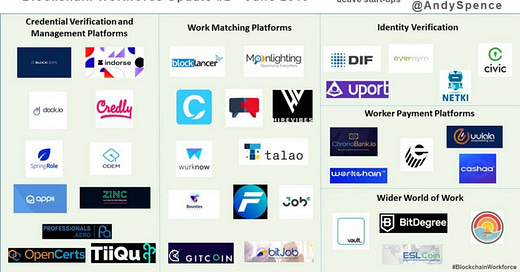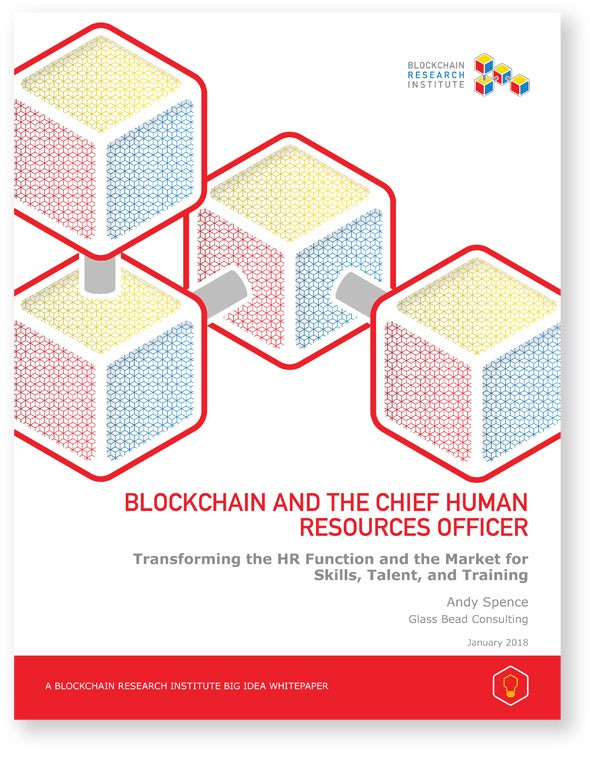We don’t know what work will need to be done in 2030.
However, the infrastructure of how we find work and workers needs to be significantly upgraded from where we are today.
This article is from the new Workforce Futurist Newsletter please subscribe here for original research and insights.
We are starting to see a new world of work emerge with microcredentials and micropayments, bounties, digital rewards for our time, attention, services, clicks, emotional labour, the data labourer and playbour, and as jobs disaggregate into tasks, there are new opportunities to rebuild work all over again.
Since Blockchain Workforce Update #1 there has been the usual innovation, fund-raising, false-starts and consolidation from the start-ups. This is not just creating new technology, but new business models and this takes time. The largest industry players are making their blockchain moves, including Salesforce, IBM, Accenture and now Facebook building services and platforms. Recently, Singapore announced that graduates will be issued with verifiable digital certificates in their Skills Passport, making a big step forward in technology and workplace innovation.
I use blockchain and AI products every day, the service is much more important to me than the underlying technology. For example, I use the Brave Internet Browser (this link has my referral code for BAT tokens). Apparently, it’s safer, with no pop-ups and better performance. You can choose to get paid in BAT tokens for watching adverts and these tokens can be used to ‘tip’ content contributors or exchanged for cash. This uses all kinds of technology including blockchain, but the interesting thing is that it turns the existing pay-per-click advertising model, where we exchange our data in exchange for useful services such as search machines, on its head.
Most interest in distributed ledger technology so far has been in financial services and supply chain. However work infrastructure needs a major rethink and upgrade, and is a multi-trillion dollar global industry, including recruitment, payroll, training and benefits. As you will see below, in work initiatives, there have been announcements of pilots by PwC, Sony, Fujitsu, Atos, and NGA HR.
There are also cross-industry collaboration initiatives such as Sovrin for digital identities and Velocity Foundation for the portability of individuals career data. Currently, our career data is held on centralised servers, in protected walled gardens, susceptible to hacking and then sold to recruiters. There might not be a public backlash (we need to work after all) but as an industry, we need to organise how we manage our data. Not the sexiest industry headline, but this will be key to building good work for all in the future. At some point, employers who buy employment services will start to gain competitive advantage from using solutions like those mentioned below, including better access to verified workers without the transaction costs. The HR technology and services industry will have to ask some big strategic questions soon including when to compete and when to collaborate.
The main driver for my interest in blockchain isn’t the technology per se, but the potential to fix current problems in the world of work. When we have verifiable career profiles, and frictionless matching platforms, then how will employers track all their workers, yet along motivate them and support productive teams? What will happen to the ‘firm’, ‘the job’ and our people management practices? And as jobs unbundle, how can we build an efficient, fair and equitable work ecosystem?
I see four main categories of solutions using blockchain in HR and work, with lots of overlap in terms of products. The chart in this article is a selection of some of the start-ups from the Blockchain Workforce Database, which has 80+ active companies. Please get in touch if you are interested in a more in-depth analysis of this ecosystem.
Identity Verification
In this ‘digital age’ it is ridiculous to think we need to carry around cards and paper documents to verify who we are and whether we are allowed access to a service or location. There are major issues with identity, where around 1 billion people in the World lack a legally recognised form of identification.
The problem is of self-sovereign identity, where individuals have sole ownership of their digital and analog identities, and control over how their personal data is shared and used.
Here’s a simple enough example, proving you are old enough to buy a beer from a vending machine without having to bring out your passport.
This video shows Civic’s Vinny Lingham demonstrating the world’s first anonymous age verifying beer machine. Scanning a QR code authorises the machine to verify your age. Cheers!
And back to the world of work, do any workplace use-cases come to mind?
Here’s one, our new employee turns up at our workplace, say a nuclear power station. How have we validated that our worker is who they say they are? Probably by paying a series of intermediaries to check paperwork, schedule meetings and hope we are dealing with truthful entities.
Sovrin Foundation and Decentralised Identity Foundation, along with Microsoft, Evernym and uPort are building solutions to self-sovereign identity — watch new standards emerge that will make managing identity easier in the 2020s.
Credential Verification and Management Platforms
As we work for many different employers, picking up different work credentials along the way, it is essential we have a digital career record to capture these. We can then chose to share some of this data with prospective employers, who can then run predictive analytics on whether someone will make a good fit for the team.
Verifiable work credentials such as work history, references, employment history, courses, university degrees can be captured on our personal digital wallets — this will leapfrog our medieval CVs and resumes on PDFs full of little-white-lies…
And this will have major implications for our people management practices, hiring, and careers.
There is a ton of activity from start-ups, major educational institutions, professional services and technology firms to build the next generation of career wallets or profiles.
Singapore has developed a blockchain platform, OpenCerts, for verifying educational certificates. From this year, 18 institutions in Singapore will issue graduates with OpenCerts certificates, which will be stored on each person’s Skills Passport. This simplifies the verification process, saves time and cost and reduces physical paperwork.
Each industry has different requirements for important credentials, an example is the highly regulated airline industry, where pilots and engineers need to have their skills assessed regularly — see for example Professional.Aero.
PwC and the Institute of Chartered Accountants of Scotland (ICAS), have developed Smart Credentials to issue chartered accountants with digital certificates on a blockchain.
Sony and Fujitsu have developed a blockchain platform to fight fake educational qualifications — they are evaluating the utility of blockchain tech in the management of course records and exam grades.
Dock has created a wallet you can use for digital credentials and also a solution for organizations.
Work Matching Platforms
One of the most impactful uses of blockchain technology over the longer-term in the world of work will be enabling more efficient peer-to-peer platforms. With workers owning their career data they can choose who they share it with. How we earn money and value, has radically changed in recent years. We provide our data for free and in return, we have access to online services e.g. from Facebook or Google. We can now earn by giving our attention, our clicks, our time, our expertise — so many different ways that will increase over the coming decade.
In the world of work, this is the largest category and ripe for disruption. At every point of friction in the market place, there is an opportunity for error, profiteering of personal data, expensive and time-consuming intermediaries and potential for mischief-making. Extensive adoption of peer-to-peer digital work-matching platforms will change everything. As I suggested in my research we will see platforms that reduce transaction fees for certain categories of workers from more than 20% to below 5% and we are starting to see that already with some of the front-runners mentioned below.
Check out these platforms using blockchain technology (and of course other technology) that are changing how we find work and earn.
For freelancers — for blockchain versions of Upwork or Fiverr, see Moonlighting (has more than 720,000 freelancer profiles), Gitcoin (for coders) Blocklancer Group (3% fees) and Job.com (sharing 5% salary signing reward to workers).
For students bitJob- The Student Marketplace allows students to earn from ‘micro-gigs’ and bidding sites.
For expertise paid by the minute, see Experty — and you can check out my profile if you have questions about Blockchain at Work or related topics!
For incentives — see The Bounties Network, and read the story of how they used token to help with the clean-up of plastic pollution in the Philipines. The final bill came to $700 (£550) for about three metric tonnes of waste removal.
For Blue-Collar workers — this technology isn’t just for young techies, and freelancers but also for the blue collar workforce too, see for example wurknow.
Worker Payment Platforms
In the modern workforce, it is an outrage that certain categories of workers are getting paid, then transferring their wages to their families overseas and paying high fees for the privilege. In 2018, $600 billion in remittances were made, the weighted-average transfer fee charged by Western Union was 7%.
When I speak to HR audiences about the opportunities of blockchain, I sometimes get a familiar question on how we respond to new technology,
‘Can we run payroll on the blockchain?’
The answer is we probably can, but that is the wrong question.
Why would we want to map 50-year-old processes onto this new technology? Paying workers every 2 weeks or monthly based on work they did weeks ago is an embedded practice from the last century. Instead, we need to ask what is the best way to pay, reward and motivate our diverse workforce?
ChronoBank.io is piloting paying construction workers in Australia, almost immediately based on their physical presence on a job site.
Etch, pioneering, ‘real-time payments’ based in London, have an agreement with ATOS where they will be developing digital smart contracts to disperse wages as variable payments using Open Banking APIs.
Wider World of Work
Vault Platform has raised $4.2m to create better ways for employees to report misconduct, such as workplace bullying or harassment.
There are plenty of others too, like BitDegree — gamified online education with token rewards.
Please help spread the word about the Workforce Futurist Newsletter!
How to Get More Involved with the Blockchain Workforce
Many of the companies mentioned, and in the headline image, have products you can try.
For a deeper dive, my research paper for the Tapscotts’ BRI is now available for PDF download here -> “Blockchain and the CHRO- Transforming the HR Function and the Market for Skills, Talent and Training”
My recent video in Singapore at Tech HR “Deep Dive: How Blockchain will Change the Way We Work”
I am always looking for relevant articles for the Blockchain and Distributed Workforce publication on Medium.
STOP PRESS
If you are already a member of the AIHR Academy, then my new eLearning course ‘Blockchain and HR’ is now available. If you are not a member, then you can enrol using the link below with a 10% discount (or by adding the ‘andyspence’ coupon in the check-out).
‘Blockchain and HR’ eLearning Course with AIHR Academy
Disclosure
I work as a strategic advisor, writer, speaker, coach on workforce transformation programmes. I keep my memberships, advisory positions, and affiliations updated on my LinkedIn profile.




